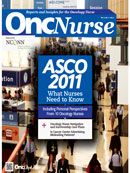Survivorship Care Plans Do Not Improve Outcomes for Patients With Breast Cancer
A randomized trial comparing survivorship care plans with standard oncologist discharge visits in patients with breast cancer found no differences in outcomes among the groups.
A randomized trial comparing survivorship care plans with standard oncologist discharge visits in patients with breast cancer found no differences in outcomes among the groups, according to data presented at ASCO.
A research team led by Eva Grunfeld, MD, DPhil, Giblon Professor and director of Family Medicine Research in the Department of Family and Community Medicine at the University of Toronto, examined Recommendation 2 from the Institute of Medicine handbook From Cancer Patient to Cancer Survivor: Lost in Transition, which states, “Patients completing primary treatment should be provided with a comprehensive care summary and follow-up plan that is clearly and effectively explained. This ‘Survivorship Care Plan’ should be written by the principal provider who coordinated oncology treatment.”
Grunfeld noted that the recommendation was made for all patients because it was considered to have face validity, although there had never been a rigorous evaluation of the hypothesis.
The multicenter study enrolled 408 patients with early-stage breast cancer who completed primary treatment at least 3 months previously (except for continued use of hormonal therapy) and without recurrent or new primary cancer. All the patients were transferred to their family practitioner (FP) for follow-up care.
Nurses Perspective
Survivorship Care Study Contradicts Expectations
Carol J. Bush, BS, RN
Nurse Navigator
Midwest Cancer Alliance
The University of Kansas Cancer Center, Kansas City
The results about survivorship care plan outcomes presented by Grunfeld et al at ASCO seem contradictory to what we hear in daily interactions with patients. Repeatedly, nurse navigators hear stories from patients lost in the shuffle and seeking to answer, “What is my roadmap once treatment ends?”
Survivorship care plans have been sought by survivors and are intended to improve care coordination. Given this report, should we ask, “Are we communicating long-term needs in a way meaningful to the survivor?”
Nurse navigators are key players in the successful integration of survivorship as a distinct phase in cancer care. Key to that role is preparing patients for a transition from the safety net of their oncology care providers and for achieving a lifetime of good health.
The field of survivorship has matured in part due to the growing voice of survivors who seek patient-centered care throughout their lifetime. Rightfully so. Given the shortage of cancer specialists and increasing complexity of cancer treatments, oncologists will not be able to follow their patients long-term. The movement toward survivorship wellness will continue and be further refined not only by the medical field, but most importantly, by patients and customer demand.
An intervention group of 200 patients received a survivorship care plan consisting of a treatment summary, a patient version of follow-up guidelines, and brochures and information about local relevant supportive care resources. These were compiled and reviewed with the patient in a 30-minute educational session with a nurse.
The FPs of intervention patients received a copy of all documents plus the full guideline and a reminder table of recommended follow-up visits and tests.
In the control group, 208 patients received a discharge visit and FPs received a discharge letter, according to usual practice.
“The primary outcome was breast cancer— related psychological adjustment at 12 months post-intervention,” said Grunfeld. She added that secondary outcomes included continuity of care, health-related quality of life (SF-36), patient satisfaction, and adherence to guidelines.
According to the researchers, there were no differences among the groups on psychosocial adjustment, or on any of the secondary outcomes studied.
“The results of this trial do not support the hypothesis that survivorship care plans are beneficial to improve patient-reported outcomes,” Grunfeld noted. “A standard discharge visit with the oncologist achieved similar results as a comprehensive care plan and educational session.”
Lynne I. Wagner, PhD, director of Supportive Oncology at the Robert H. Lurie Comprehensive Cancer Center of Northwestern University in Chicago and co-chair of the session in which the data were presented, said that she was surprised by Grunfeld’s findings because a survivorship care plan “seems like the right thing” to do.
Wagner did, however, note one positive result from the study.
“The finding in both arms of the study that the primary care physician is the correct point of contact is significant given the anticipated gap in the oncology workforce in the United States,” Wagner said. “It will become increasingly important for survivors to know who their ‘go-to’ medical provider is.” ASCO Abstract 9005

Nurse Practitioners Weigh in on Data From the San Antonio Breast Cancer Symposium
January 16th 2023Loyda Braithwaite, MSN, RN, AGPCNP-BC, AOCNP; and Jamie Carroll, APRN, CNP, MSN, highlight presentations from the 2022 San Antonio Breast Cancer Symposium that will influence oncology nursing practice.


